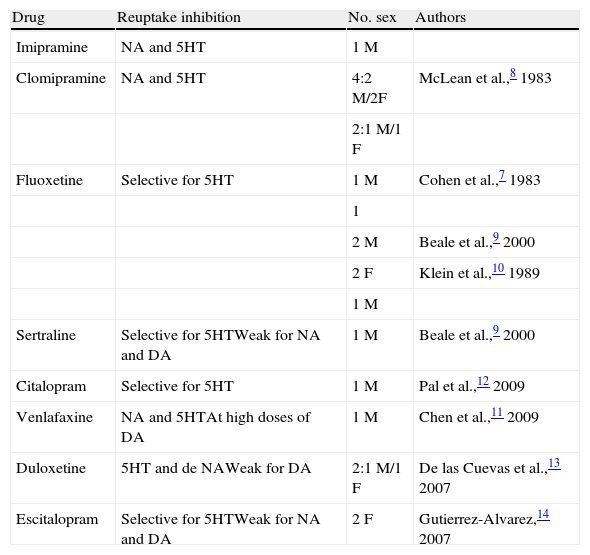The neurobiological processes involved in yawning are complex. Yawning is controlled by the dopaminergic1 and oxytocinergic systems.2 These systems activate the cholinergic system,1,2 which may also be activated by the serotonergic system.2 On the neuroanatomical level, yawning involves motor centres of the brainstem (V, VII, IX, X, XI, and XII) and the spinal cord, which are controlled by the paraventricular nucleus of the hypothalamus.1,2 A group of oxytocin neurons situated in the parvocellular region of the paraventricular nuclei and extending towards the hippocampus facilitate yawning, in conjunction with the locus coeruleus and the spinal cord.1,2 Yawning results when these neurons are stimulated by dopamine or dopaminergic agonists, histamine, or oxytocin1; it is inhibited by opioids and γ-aminobutyric acid.1,2 The serotonergic system also facilitates yawning.1 Serotonergic activation and dopaminergic inhibition may work together in the event of yawning.1,2 In addition, the serotonergic system also interacts with the cholinergic system, since the serotonin reuptake inhibitor citalopram (Lu 10-171) favours yawning induced by physostigmine (a cholinergic antagonist).1 Yawning is also indicative of numerous pathological processes that generally go unnoticed in clinical practice2 (intracranial hypertension, migraine, cerebrovascular accidents, frontal lobe tumours, temporal lobe epilepsy, progressive supranuclear palsy, multiple sclerosis, thalamotomy, liver and kidney failure, opiate withdrawal, etc.).2 Some drugs,1,2 such as dopaminergic agonists1 or serotonin reuptake inhibitors,3–14 may provoke yawning as a side effect (Table 1). According to some drug safety reports, paroxetine may also cause yawning (5 cases).15
Clinical cases of yawning after treatment with serotonin reuptake inhibitors.
| Drug | Reuptake inhibition | No. sex | Authors |
| Imipramine | NA and 5HT | 1 M | |
| Clomipramine | NA and 5HT | 4:2 M/2F | McLean et al.,8 1983 |
| 2:1 M/1 F | |||
| Fluoxetine | Selective for 5HT | 1 M | Cohen et al.,7 1983 |
| 1 | |||
| 2 M | Beale et al.,9 2000 | ||
| 2 F | Klein et al.,10 1989 | ||
| 1 M | |||
| Sertraline | Selective for 5HTWeak for NA and DA | 1 M | Beale et al.,9 2000 |
| Citalopram | Selective for 5HT | 1 M | Pal et al.,12 2009 |
| Venlafaxine | NA and 5HTAt high doses of DA | 1 M | Chen et al.,11 2009 |
| Duloxetine | 5HT and de NAWeak for DA | 2:1 M/1 F | De las Cuevas et al.,13 2007 |
| Escitalopram | Selective for 5HTWeak for NA and DA | 2 F | Gutierrez-Alvarez,14 2007 |
NA: noradrenaline; 5HT: serotonin; DA: dopamine; M: male; F: female.
We present the case of a woman aged 37 who was first monitored by the psychiatric department in 2010 due to obsessive thoughts and egodystonic compulsions. The rest of her medical history was anodyne. She met DSM IV-TR criteria for obsessive-compulsive disorder, and doctors decided to treat her with escitalopram in increasing doses over a 3-week period until reaching 20mg/day. The patient was not taking any other drugs. Treatment initially resulted in clinical improvement and the patient reported frequent yawning as a side effect, with episodes occurring regularly throughout the day. This was the only side effect, and it had very little repercussion on the different aspects of the patient's life. After escitalopram was reduced to 15mg/day, yawning frequency decreased and had disappeared completely after 10 days. At present, the patient remains stable on a dose of 10mg/day, with good level of tolerance and no adverse effects.
This 37-year-old woman therefore experienced yawning as a dose-dependent side effect of escitalopram. This case coincides with a published case involving citalopram.8 Yawning is a side effect of both non-selective4,7,8,12,14 and selective3,5,6,8,10,11,13 serotonin re-uptake inhibitors (SSRIs). The literature contains only a few cases due to their low frequency and/or non-detection of this sign.4 Yawning does not seem to be sex-related (Table 1). Yawning is an easily observable clinical sign that may be an adverse drug effect or an alarm sign indicating central nervous system disease or other neuropsychiatric disorders.1,2 However, yawning is underinvestigated and rarely examined in the clinical setting.2
Early detection of the temporal relationship between onset of excessive yawning and treatment with serotonergic agents1 allows doctors to offer simple remedies such as decreasing dosage or changing the treatment. This serves to prevent unnecessary healthcare spending on more complex complementary tests and also lets doctors rule out serious diseases.1,2
Please cite this article as: Roncero C, Mezzatesta-Gava M, Grau-López L, Daigre C. Bostezos como efecto secundario dependiente de la dosis del tratamiento con escitalopram. Neurología. 2013;28:589–590.






